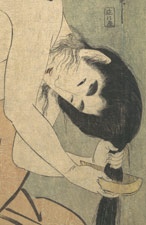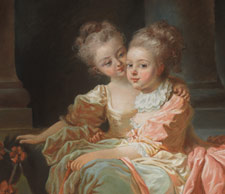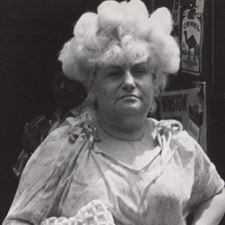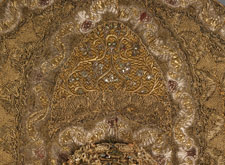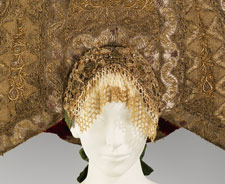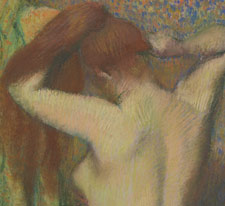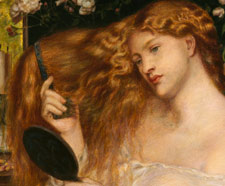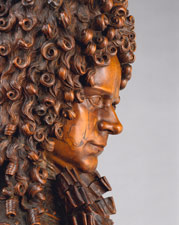New Connections appear every Wednesday. Sign up for a reminder.
 1280852
1280852 8111024
8111024 7071024
7071024 6761024
6761024 7131024
7131024 6641024
6641024 8141024
8141024 11861024
11861024 8151024
8151024 1280866
1280866 8101024
8101024 7911024
7911024 8051024
8051024 10231024
10231024 8021024
8021024 11581024
11581024 1280939
1280939 12521024
12521024 11101024
11101024 7631024
7631024 11191024
11191024 12111024
12111024 1280856
1280856 7451024
7451024 6001024
6001024 8731024
8731024 12391024
12391024 6361024
6361024 8371024
8371024 7271024
7271024 8161024
8161024 8631024
8631024 1280852
1280852
My name is Peggy Fogelman and I head up Education at the Met and my topic is "Bad Hair."
Everyone I know is somewhat obsessed with their hair. If you say, "I'm
having a bad hair day," everyone knows what you're talking about. Part
of the reason that we obsess over it is because it's so integral to our identity.
Maybe it's because we can change it.
How frustrating is that, when you just can't get it to do what you want to do.
When I was four years old, every day was a good hair day.
No matter how bad it looks somehow, it always looks good. I always wanted hair
just like my mother's. She had her photograph taken at the age of nineteen, and it was the '40s. She looks like a movie star. My own hair never achieved
that greatness. My mother was constantly nagging me to get my hair out of my eyes and put it behind my ears and I always resisted. At that moment in your life, you're so obsessed with your hair, and you want it to look cool. And at the same time, you're so anxious about your looks that
you really wanna hide behind your hair, too. Bad hair for men can be a sign
of genius, and it looks like his hair has been electrified by the incredible intellectual workings of his brain. Women don't have such an easy time.
Bad hair indicates some very misplaced sense of style
and, you know, ineptitude at dressing oneself appropriately. Even
being the goddess of beauty doesn't absolve you from the responsibility to "Do your hair!" There are ways
that you could mitigate bad hair. It was traditional for Russian married women to wear hair coverings. The
metallic threads and the glass and the mother of pearl must have really shimmered in
candlelight, so that it would become a giant halo. You could also distract people
from your bad hair with really incredible hair ornaments.
We know that hair can be an incredibly soft, pleasurable experience to touch someone's hair, but it's
also an invasion of certain personal boundaries, you can't go up to anyone on the street and just touch their hair. So
we imagine as we are seeing the sense of touch.
These mourning brooches were a way of enabling someone to preserve the memory of their loved one and carry it with them wherever they went, and that was through their hair.
It was really conventional for mature women to wear their hair up. Only certain types of
women, at certain periods, would be seen wearing their hair down. It often has a suggestion of sensuality or
sexual availability. But it could also be kind of dangerous
like, fatal, in the case of Lilith.
As much as we struggle with our hair—straightening and curling and dyeing—and as much
anxiety as we have about our hair, it is something that
really identifies us in the minds and hearts of other people and
can be this wonderful repository for their memory of us. In the end, it really
is one of those things that most identifies us in other people's minds, and therefore can be a vehicle for
all the really positive feelings that they have about us.
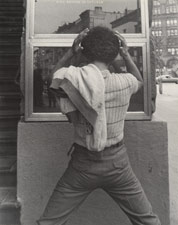 |
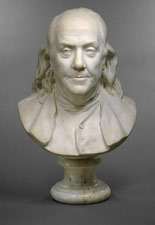 |
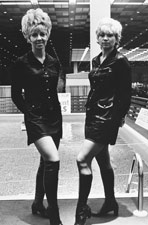 |
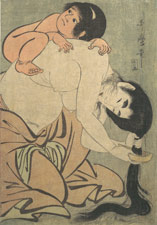 |
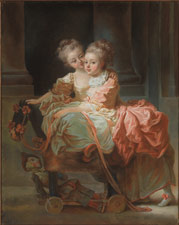 |
 |
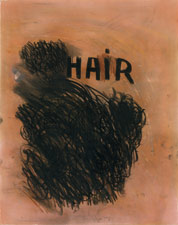 |
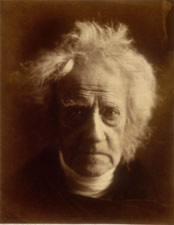 |
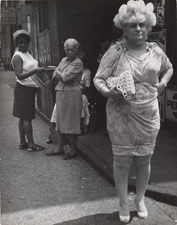 |
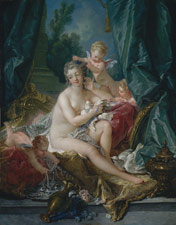 |
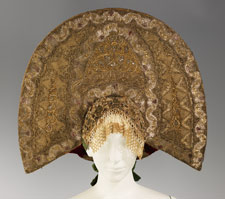 |
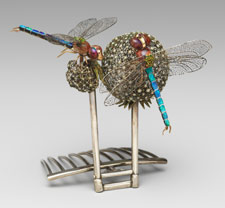 |
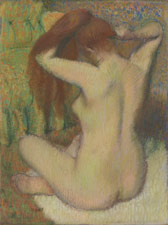 |
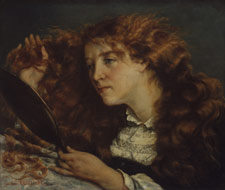 |
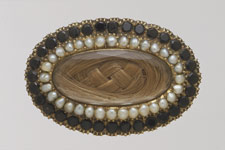 |
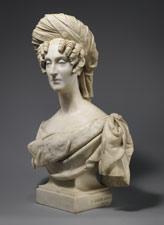 |
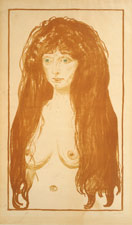 |
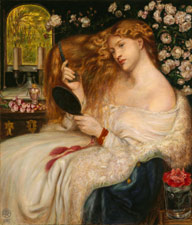 |
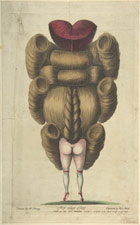 |
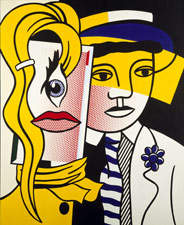 |
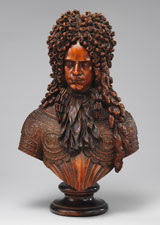 |
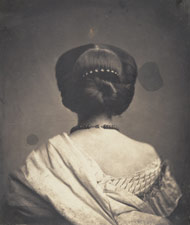 |
Works of art in order of appearanceLast Updated: June 22, 2015. Not all works of art in the Museum's collection may be on view on a particular day. For the most accurate location information, please check this page on the day of your visit. |
||
 |
[Street Scene: Young Man Fixing Hair in Window, New York City] 1970s Leon Levinstein (American) Gelatin silver print Gift of Gary Davis, 2008 (2008.664.23) © Howard Greenberg Gallery More information: The Collection Online Not on view
|
 PhotographsSecond Floor
PhotographsSecond Floor |
 |
Benjamin Franklin (1706–1790) 18th century (1778) Jean-Antoine Houdon (French) French (Paris) Marble Gift of John Bard, 1872 (72.6) More information: The Collection Online Not on view
|
 European Sculpture and Decorative ArtsFirst Floor
European Sculpture and Decorative ArtsFirst Floor |
 |
[Three Views, Various Subjects: Coney Island Hotdog Stand, Woman in Hawaiian Costume, Two Women in Front of Swimming Pool] 1960s–70s Unknown Artist (American) Gelatin silver print Walker Evans Archive, 1994 (1994.263.93.1–3) More information: The Collection Online Not on view
|
 PhotographsSecond Floor
PhotographsSecond Floor |
 |
Yamauba Combing Her Hair and Kintoki Edo period, ca. 1801 Kitagawa Utamaro (Japanese) Polychrome woodblock print; ink and color on paper Gift of Estate of Samuel Isham, 1914 (JP979) More information: The Collection Online Not on view
|
 Asian ArtSecond Floor
Asian ArtSecond Floor |
 |
Two Sisters 1770 Jean-Claude-Richard de Saint-Non (French) Pastel on paper, laid down on canvas Gift of Daniel Wildenstein, 1977 (1977.383) More information: The Collection Online Not on view
|
 European PaintingsSecond Floor
European PaintingsSecond Floor |
 |
[Girl Leaning on Wire Fence in Yard, Vicinity Bethlehem, Pennsylvania] 1935 Walker Evans (American) Film negative Walker Evans Archive, 1994 (1994.253.326.3) More information: The Collection Online Not on view
|
 PhotographsSecond Floor
PhotographsSecond Floor |
 |
Hair 1961 Jim Dine (American) Pastel on paper Gift of Stanley Posthorn, 1991 (1994.256.645) © 2010 Jim Dine / Artists Rights Society (ARS), New York More information: The Collection Online Not on view
|
 Modern and Contemporary ArtSecond Floor
Modern and Contemporary ArtSecond Floor |
 |
Sir John Herschel 1867 Julia Margaret Cameron (British) Albumen silver print from glass negative The Rubel Collection, Promised Gift of William Rubel (L.1997.84.6) More information: The Collection Online Not on view
|
 PhotographsSecond Floor
PhotographsSecond Floor |
 |
[Street Scene: Woman in Blonde Wig and Tight Dress, New York City] 1960s Leon Levinstein (American) Gelatin silver print Gift of Gary Davis, 2009 (2009.483.30) © Howard Greenberg Gallery More information: The Collection Online Not on view
|
 PhotographsSecond Floor
PhotographsSecond Floor |
 |
The Toilet of Venus 1751 François Boucher (French) Oil on canvas Bequest of William K. Vanderbilt, 1920 (20.155.9) More information: The Collection Online Not on view
|
 European PaintingsSecond Floor
European PaintingsSecond Floor |
 |
Headdress 1800–1880 Russian Metal silk, paper, cotton, metal, mother-of-pearl, glass, semi-precious stones Brooklyn Museum Costume Collection at The Metropolitan Museum of Art, Gift of the Brooklyn Museum, 2009; Gift of Mrs. Edward S. Harkness in memory of her mother, Elizabeth Greenman Stillman, 1931 (2009.300.2266a, b) More information: The Collection Online Not on view
|
 The Costume InstituteFirst Floor
The Costume InstituteFirst Floor |
 |
Hair ornament ca. 1904 Louis Comfort Tiffany (American) Silver, enamel, black and pink opals, demantoid garnets Gift of Linden Havemeyer Wise, in memory of Louisine W. Havemeyer, 2002 (2002.620) More information: The Collection Online Not on view
|
 American Decorative ArtsFirst and Second Floors
American Decorative ArtsFirst and Second Floors |
 |
Woman Combing Her Hair ca. 1888–90 Edgar Degas (French) Pastel on light green wove paper, now discolored to warm gray, affixed to original pulpboard mount Gift of Mr. and Mrs. Nate B. Spingold, 1956 (56.231) More information: The Collection Online Not on view
|
 European PaintingsSecond Floor
European PaintingsSecond Floor |
 |
Jo, La Belle Irlandaise 1865–66 Gustave Courbet (French) Oil on canvas H. O. Havemeyer Collection, Bequest of Mrs. H. O. Havemeyer, 1929 (29.100.63) More information: The Collection Online Not on view
|
 European PaintingsSecond Floor
European PaintingsSecond Floor |
 |
Brooch ca. 1850 Maker unknown (American) Gold, jet, crystal, hair Purchase, Susan and Jon Rotenstreich Gift, 2000 (2000.557) More information: The Collection Online Not on view
|
 American Decorative ArtsFirst and Second Floors
American Decorative ArtsFirst and Second Floors |
 |
Queen Marie-Amélie of France 1841 Baron François-Joseph Bosio (French) Marble Wrightsman Fund, 1990 (1990.60) More information: The Collection Online Not on view
|
 European Sculpture and Decorative ArtsFirst Floor
European Sculpture and Decorative ArtsFirst Floor |
 |
The Sin 1902 Edvard Munch (Norwegian) Lithograph printed in yellow, red, and green Gift of Philip and Lynn Strauss, 1984 (1984.1167) More information: The Collection Online Not on view
|
 Drawings and PrintsSecond Floor
Drawings and PrintsSecond Floor |
 |
Lady Lilith 1867 Dante Gabriel Rossetti (British) Watercolor and gouache on paper Rogers Fund, 1908 (08.162.1) More information: The Collection Online Not on view
|
 Drawings and PrintsSecond Floor
Drawings and PrintsSecond Floor |
 |
Top and Tail 1777 Anonymous (British) Hand-colored etching with stipple The Elisha Whittelsey Collection, The Elisha Whittelsey Fund, 1959 (59.533.5) More information: The Collection Online Not on view
|
 Drawings and PrintsSecond Floor
Drawings and PrintsSecond Floor |
 |
Stepping Out 1978 Roy Lichtenstein (American) Oil and Magna on canvas Purchase, Lila Acheson Wallace Gift, Arthur Hoppock Hearn Fund, Arthur Lejwa Fund in honor of Jean Arp; and The Bernhill Fund, Joseph H. Hazen Foundation Inc., Samuel I. Newhouse Foundation Inc., Walter Bareiss, Marie Bannon McHenry, Louise Smith, and Stephen C. Swid Gifts, 1980 (1980.420) More information: The Collection Online Not on view
|
 Modern and Contemporary ArtSecond Floor
Modern and Contemporary ArtSecond Floor |
 |
Bust of Alexander Menshikov (ca. 1670–1729) ca. 1703–4 Swiss, Austrian, or German artist (active Russia) Red pine (pinus sylvestris), wrought iron Wrightsman Fund, 1996 (1996.7) More information: The Collection Online Not on view
|
 European Sculpture and Decorative ArtsFirst Floor
European Sculpture and Decorative ArtsFirst Floor |
 |
Woman Seen from the Back ca. 1862 Onèsipe Aguado (French) Salted paper print from glass negative Gilman Collection, Purchase, Joyce F. Menschel Gift, 2005 (2005.100.1) More information: The Collection Online Not on view
|
 PhotographsSecond Floor
PhotographsSecond Floor |
© 2011 The Metropolitan Museum of Art |
||

